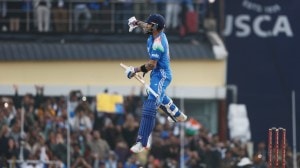Centre stifles debate, amends ICWA Act
The Government today managed to amend the Indian Council of World Affairs (ICWA) Act amid stiff opposition in Lok Sabha with the Congress al...

The Government today managed to amend the Indian Council of World Affairs (ICWA) Act amid stiff opposition in Lok Sabha with the Congress alleging attempts at saffronising the institute and demanding that the Bill be sent to the Standing Committee.
The Opposition demand — coming after Minister for State for External Affairs Digvijay Singh had already given his reply — started a procedural debate that lasted for over an hour. It ended with rejoicing in Treasury benches and a Congress walkout as Deputy Speaker P.M. Sayeed ruled that ‘‘it may perhaps not be proper’’ to refer the Bill to Standing Committee after the House had already considered the Bill.
|
Govt says no to more powers to states
|
| NEW DELHI: The Govt on Friday quashed attempts in Lok Sabha at giving residuary powers to the states terming them as impractical and a threat to country’s security and integrity. Minister of State for Home I.D. Swami said ‘‘vesting residuary powers with states is unacceptable. If feasibility of such a move is considered, it will not be possible.’’ He was replying to a debate on a Private Member’s Bill seeking to amend the Constitution for giving more powers to states.
Swami said any such move would be against the basic features of the Constitution. The Sarkaria Commission had observed that the present scheme had stood the test of time, he said. Besides, states may legislate divergent laws which could clash if they were given residuary powers. Such measures may threaten the supremacy of Parliament. After the minister’s observation, Suresh Kurup (CPI-M) withdrew the Bill and said his only intention was to highlight financial crisis faced by the states. Adding that states should get more financial powers, he said the BJP had always advocated a strong Centre. (ENS) |
Preceding the ruling, the House witnessed a heated debate over procedure of introducing, consideration and passing of a Bill, with Congress deputy leader in Lok Sabha Shivraj Patil alleging that Sushma Swaraj may not be conversant with the rules since she had been Parliamentary Affairs Minister for a short time.
Patil, former Speaker, said all Bills after being introduced, and the first reading, have to go to Standing Committee unless the House decides otherwise. Refuting this, Sushma said the issue should have been raised at the Business Advisory Committee meeting and not now after the process was completed.
It was a lesson in Political Science as Patil explained the procedure of passing a Bill in three stages. Sushma said she was well-versed in the rules even before she became an MP 13 years ago. She knew all about passing of Bills rules 33 years ago while studying for a Law degree.
Sayeed initially found himself at a loss to give a ruling as he kept saying he needed to check the records for precedents. Finally he said the Speaker had not referred the Bill to Standing Committee in his wisdom and allowed voting. Replying to the debate, Digvijay said the Government took over the ICWA only after the Standing Committee made such recommendations and as ‘‘things had started deteriorating there after the appointment of a working president’’ in early 1980s.
|
FOR THE RECORD
|
| The parliamentary standing committee on the Ministry of Environment and Forests expressed concern that the cleaning of rivers Ganga and Yamuna has not been satisfactory. On the Ganga action plan, the committee felt that strong administrative will would be needed. ‘‘In the light of the rusty red water at the Sangam at Prayag in feb 2003, the degree of decrease in pollution of Ganga looked unreal,’’ the report says. |


- 01
- 02
- 03
- 04
- 05





























